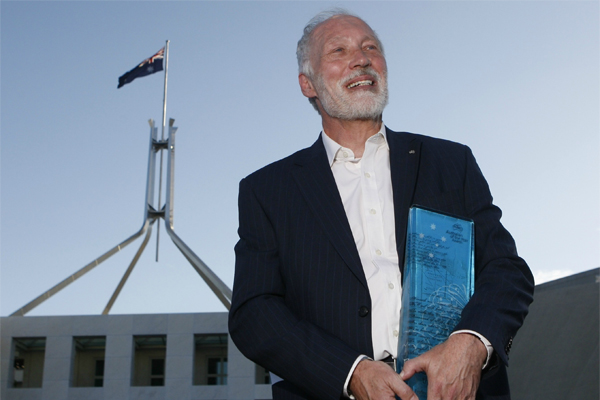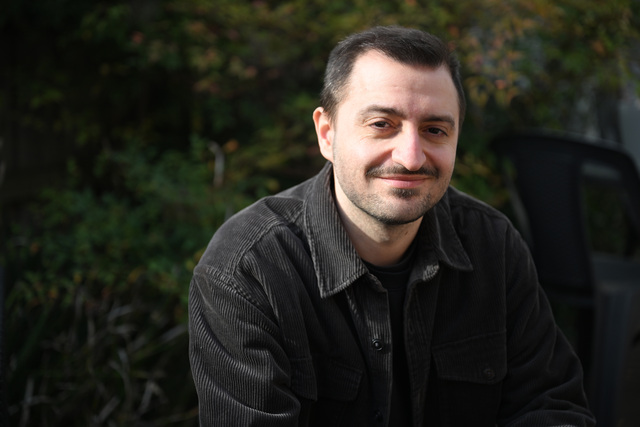Professor Patrick McGorry became the accidental face of mental health when he was named Australian of the Year in 2010. Two years on, his fight for mental health reform continues, writes Robert Fedele.
WITH a lineage deeply rooted in medicine, it’s not surprising Patrick McGorry followed the career that has gained him a national profile.
‘‘My dad and grandmother were doctors, my mother was a nurse. There’s a lot of medicine in the family,’’ he muses.
The McGorry clan hail from Ireland. A teenage Patrick and his family emigrated in 1968, specifically to the New South Wales seaside city of Newcastle.
He later progressed to university where he duly enrolled in medicine, completing four years of study before steering a course into matters of the mind.
‘‘Medicine I found a bit limiting,’’ he says. ‘‘Psychiatry, when I was a medical student, seemed much more fascinating … the human condition and trying to understand it all.’’
A shift in thinking had already begun. ‘‘I was a bit reluctant to get involved because it didn’t treat people very well,’’ he recalls of the system.
‘‘I guess there was identification with the patients because they were getting such a raw deal. They were marginalised, very stigmatised in those days. It’s still a bit of a problem, but it’s getting better.’’
The wish to stick up for the underdog has never left McGorry, who moved to Melbourne in 1984 after studying psychiatry.
He now lives in Essendon.
He began his work in a research unit called the Early Psychosis Prevention and Intervention Centre (EPPIC), attached to a large public mental health program at the former Royal Park Hospital in Parkville.
McGorry and his colleagues focused on young people who were hospitalised while experiencing their first episode of psychosis.
‘‘It was horrible what they had to go through so we tried to understand how to treat them better, how to use less medication, how to build more psychological and social supports for them.
‘‘In those days they got medicated and that was about it, whereas now we’ve got a much more holistic approach. Medication is still a big part for me, but there’s a lot more to offer.’’
Today McGorry can be found not far from his old stomping ground, at the Orygen Youth Health Research Centre in Parkville, which grew out of (EPPIC).
OYH has three main components: a specialised youth mental health clinical service, an internationally renowned research centre, and an integrated training and communications program.
It treats people aged 15–25 with mental health issues in the western and north-western suburbs of Melbourne.
‘‘If you happen to have a mental health problem in this age group in the west you’re in much better hands than if you were in the eastern suburbs,’’ he admits.
McGorry, 59, is also on the board of Headspace, the National Youth Mental Health Foundation, which now has 90 centres across Australia.
In a modest office within a portable, he’s happy to open up on his views on the state of youth mental health.
The softly spoken McGorry’s main concerns surround early intervention and reducing the chances of full-blown psychosis.
‘‘[It’s] applying the same principles that you apply for diabetes, cancer or heart disease to mental health. Trying to pick up the problem as soon as it actually appears so the young person’s life doesn’t have to become a smoking ruin before they get help.’’
Yet his stance on early psychosis prevention is no stranger to controversy.
A quick Google search reveals several articles questioning the use of anti-psychotic drugs, and the risk of attempting to define illnesses resulting in the unnecessary medication of patients.
McGorry is quick to correct what he sees as mistruths.
‘‘We don’t use medication in those early stages,’’ he corrects.
‘‘We use lifestyle and social and psychological interventions first and if they don’t work we move on to medication.’’
The argument against early intervention is intertwined with fears of creating a generation of hypochondriacs.
‘‘OK, well, it might be a bit worrying having these illnesses but on the other hand it means we can get real help at the earliest point. We don’t have to wait until we’re in dire straits.
‘‘We’re not too worried about diagnoses actually. We’re just trying to help young people. If you’re struggling you need someone to listen to your story and you need to get help.
‘‘We don’t want to make people dependent or create problems where they don’t exist, but these problems are real.’’
Asked about the history of mental health treatment and how far it’s come, McGorry flashes back to the ’80s.
He says the 19th century asylum model that he trained in was only done away with in the ’90s. Before that treatment was rigid and the biggest failure, he says, was the lack of a specific youth mental health stream of care.
‘‘Our current mental health system of late intervention within a beleaguered acute health system often abandons people at precisely the times they should be getting the most help,’’ his website declares.
‘‘They just dumped it in the acute hospitals and they didn’t build up the community and mental health side properly, so people are ending up in the emergency departments and the acute admissions wards of these general hospitals. And that’s the main thing that’s provided still.
‘‘So, in a way, the experience of the patient isn’t dramatically better in standard mental health care than it was back in the asylum days.’’
Yet while McGorry often laments the problems facing mental health, his outlook is largely positive.
He views Orygen as a success and is optimistic about its future.
‘‘We kind of reinvented the thing over the past 20 years or so and attracted a lot of national and international interest.
‘‘I feel optimistic we can actually continue to improve the thing but we definitely need community support.’’
Support of a different kind came when McGorry was named Australian of the Year in 2010.
Largely unknown, other than by those in the medical profession, McGorry suddenly became the face of mental health.
‘‘It was a bit surreal in some ways, very unexpected,’’ he says of the honour. ‘‘But it was great to help us with our mission of improving mental health care and especially for young people.
‘‘I think there’s still some legacy of that.’’
McGorry concedes his newfound profile allowed him to push his agenda.
Mental health received billions of dollars in funding in last year’s budget, much of it directed at causes close to McGorry such as Headspace.
‘‘We did get much better access and community support because of that. But on the other hand it provoked a lot of push-back from our mental health colleagues,’’ McGorry points out.
Pressed further, he says he’s felt the brunt of the tall poppy syndrome.
‘‘It was a big responsibility. I wasn’t that public a person, but I felt I had to go for it.
‘‘I’d been trying to get that support for years before that so it was a great gift in a way.
‘‘[But] there’s been a downside because the tall poppy problem definitely happens as well. It’s a risky thing to be that prominent, mainly from colleagues; I wouldn’t say from media or political people. It’s been a small number of colleagues I’ve experienced it from. I guess it’s par for the course.’’
So does he consider himself controversial?
‘‘I do because we just say it’s not good enough, the way mental health care is, and that’s part of the reason why we got in trouble with some of our colleagues, because they’re much more complacent.
‘‘They want to defend a status quo and that’s not good enough for a country like Australia.
‘‘We say we want it to be a lot better and we want young people and their families to have much more of a say over the way things are provided.’’
Orygen’s services include inpatient, acute, outreach, case management, psychosocial programs, peer and family support.
The research centre leads a range of studies to better understand the biological, psychological and social factors that influence onset, remission and relapse of mental illnesses, in order to find better ways to prevent or reduce the impact of mental disorders for young people.
McGorry offers examples of innovations, such as the use of fish oil to reduce the risk of psychosis, which has already seen pleasing results.
Later, the discussion moves to suicide, an issue McGorry feels strongly about and wants to tackle.
‘‘There are people dying around the north west of Melbourne every year. There’d probably be about 30 or 40 youth suicides [a year] happening because of a lack of help for young people. So it’s a serious thing.’’
It seems the main argument surrounding the covering up of suicide is the potential for ‘copycat’ episodes, a notion McGorry doesn’t subscribe to.
‘‘Actually, most of the copycats are driven by the Facebook sort of avenue or word of mouth, not by mainstream media.
‘‘The mainstream media reports the celebrity suicides anyway, which are the ones that are the most dangerous.
‘‘Whereas the ordinary suicide like John Smith in Moonee Ponds who killed himself is not actually reported, and that’s the one that should be because then people will be much more aware of how big a problem it is.’’
On a lighter note, McGorry spends his downtime surfing, the evidence plain to see from a Gone Surfing poster on his wall. He also cheers on his beloved North Melbourne Kangaroos in the AFL.
His wife is a physiotherapist and his three sons are involved in music, one of them a trumpeter with Eagle and the Worm, another the guitarist for Sasquatch.
He feels there’s still plenty for him to achieve. ‘‘Psychiatry is the sort of thing you can keep doing until you’re quite old. And hopefully you might get better at it with a bit more wisdom and age.’’







